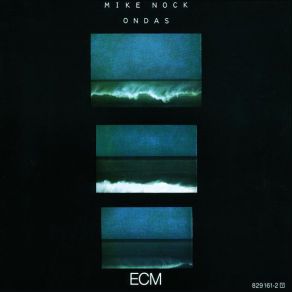Ondas
Download links and information about Ondas by Mike Nock. This album was released in 1981 and it belongs to Jazz genres. It contains 5 tracks with total duration of 51:11 minutes.

|
|
|---|---|
| Artist: | Mike Nock |
| Release date: | 1981 |
| Genre: | Jazz |
| Tracks: | 5 |
| Duration: | 51:11 |
| Buy it NOW at: | |
| Buy on iTunes $11.99 | |
| Buy on Amazon $11.49 | |
Tracks
[Edit]| No. | Title | Length |
|---|---|---|
| 1. | Forgotten Love | 15:58 |
| 2. | Ondas | 9:11 |
| 3. | Visionary | 11:35 |
| 4. | Land of the Long White Cloud | 7:59 |
| 5. | Doors | 6:28 |
Details
[Edit]At the time of this recording, New Zealand's Mike Nock was one of the great, unsung pianists in European stlyed jazz. His elegant phrasing and wildly inventive melodicism fly in the face of all notions that claim improvisation must be outside Western musical parameters and structures. On Ondas, Nock has assembled a rhythm section that, while never having played together before shared the ability to create the bedrock, however flexible, for the artist's crystalline compositions and solos. Eddie Gomez was a wise choice for this session because of his experience with Bill Evans, who is an obvious influence on Nock's own composing — as is Keith Jarrett. His pizzicato flourishes and shifting timbres on "Forgotten Love" and "Visionary," while retaining an elemental sense of meter, are remarkable. Christensen is the greatest of all the drummers in the ECM stable. His style is one of paucity and sparse riffs, but his cymbal "dancing" is a trademark favorite of pianists and saxophonists everywhere. He has the ability to open up time, creating a window for improvisers to stretch each note, each interval, each mode, for all it's worth, suspending notions of time and space for the listener. Evidence is on the title track and "Land of the Long White Clouds." For his part, Nock is a magician of lyrical invention. His compositional architecture is created of minor modes and subtle textures. His chords are small enough to be their own rhythm section and large enough to fit all the notes in between them and the next octave in combinatory gestures of shimmering beauty. He does all of this in a manner in which tension and its resolution are in constant flux, never out of balance with one another. His solo on "Forgotten Love," that is based upon Gomez', is a case in point: towering ivy clusters of notes flex over darkened minor chords, up and through the middle and then upper registers of the instrument before inviting Gomez back in. In all, this is a glorious recording by a crack batch of musicians. It is also a stellar example of what Manfred Eicher's label and production offer to the world.